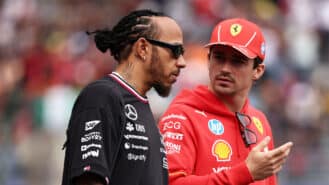
Verstappen proves Russell right: Abu Dhabi GP 2024 – Up/Down
Verstappen's prang at the first corner of the F1 finale in Abu Dhabi vindicated George Russell's recent rant
It has taken a while coming, but there is increasing recognition among major car manufacturers in the world that if you are to design a car with a truly outstanding chassis, all the pounding of proving grounds, laps of the Nürburgring and visits to frozen lakes and Middle Eastern deserts may not do it for you.
There is a missing ingredient, a test so reliable, so simple to replicate and so revealing in what it tells you about your car that more and more car companies are including it as an integral, essential part of their test programme. This ingredient is called the British B-road.

Cars that feel really quite capable on the shiny new roads of Europe that manufacturers prefer to take us to for their launches can feel utterly inept the moment you get them home. Historically Audis in particular have fallen foul of this effect. And have you wondered why, whatever their other faults may be, Lotuses and Jaguars have almost always had fabulously accomplished chassis?
It’s because if you can make a car feel even reasonably good over here, it’s going to be nothing less than brilliant everywhere else. I have no doubt that if the McLaren MP4-12C had been developed outside the UK, it would feel completely different and not have the most composed ride of any supercar the world has seen so far.

Why? It’s partly because our roads are so dismally maintained, but also because they have a higher than average crown in the middle. Our road designers seem also to have either a cruel sense of humour or no commonsense. I know nowhere in Europe or America where the cambers, radii and surfaces seem to have been determined by so much pot luck. Less than a mile from my house there is a quick curve concealing entirely the entry to a railway museum at its apex. And if you survive that there’s a turn immediately afterwards which seems even quicker. And indeed it is until, just as you think it must open out, it turns in again with a vengeance.
I know we should all drive with an even greater margin of safety on roads we don’t know and I know equally well that not everyone does, which is why the Medivac helicopter is such a depressingly frequent visitor to this neck of the woods.
For a chassis designer, it’s a difficult balance. Clearly stability is essential so the car doesn’t spin if you suddenly have to brake to change direction while cornering quickly. But too much stability means the car sticks dogged to its original line, which may be the last thing you want.
Of course electronic stability systems have helped cars maintain the intended lines of their drivers, but they are no substitute for a chassis that is supple and agile enough to cope with all a British country road can throw at it.

This is why, for instance, every product sold by Volkswagen now has a session on UK roads mandated into their development programmes. And I don’t just mean Golfs and Polos, I mean Audis, Skodas, Lamborghinis, Porsches, Seats and Bugattis. Their engineers now know what their British counterparts have kept secret for decades: to make a really good chassis, you need our really bad roads.

Verstappen's prang at the first corner of the F1 finale in Abu Dhabi vindicated George Russell's recent rant

FIA president Mohammed Ben Sulayem seemed intent on making F1 a united front by the end of the 2024 Qatar GP – against him

Leclerc erupted after feeling wronged one time too many by Sainz in Vegas – but the challenge posed by his team-mate next year, Lewis Hamilton, will be much greater writes James Elson

2024 has been Max Verstappen's masterclass – it should go down in history as one of F1's greatest titles